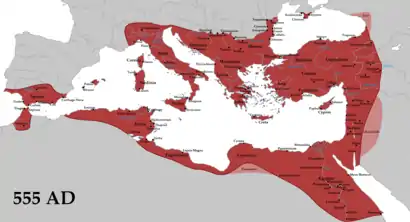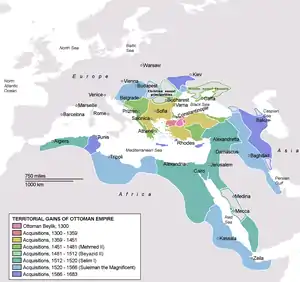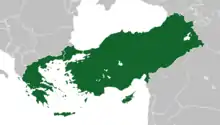Hellenoturkism
Hellenoturkism is a political concept that encompasses two things: a fact of civilization (i.e. the co-habitation and interdependence, since the 11th century A.D., of the Greek and Turkish peoples and cultures), and a political ideology based on the above civilizational phenomenon, which aims at establishing a Greek-Turkish political ensemble.
From Empire to Confederation
According to Dimitri Kitsikis, from the time of the Persian Empire and Alexander the Great, to the collapse of the Ottoman Empire in the 20th century A.D., the Intermediate Region has been covered by an ecumenical empire that had common civilizational characteristics, despite the fact that it passed into the hands successively of the Persians, to the Greeks, to the Romans, to the Byzantines and, finally, to the Ottomans. This central civilization of the Intermediate Region, existing since the time of Cyrus the Great, bore the characteristics, since the 11th century A.D. and for the last thousand years, of Greek and Turkish cultures. The Ecumenicity of the Empire was Hellenoturkism.[1]


In the 15th century, a Greek philosopher, George of Trebizond, 1395-1484 (the date of his death varies from 1472 to 1486 depending on the sources), who aimed at synthesizing Turkish Islam in the form of Bektashism and Christianity in the form of Greek Orthodoxy,[2] is considered by supporters of Hellenoturkism as the founder of their ideology.[3] He addressed the new ruler of the Empire, Mehmed the Conqueror, in a letter of 1466, as the legal emperor of the Romans and of the whole Universe and also as the common emperor of both Romans and Turks.[4]
.jpg.webp)
In the 20th century, the ideology of Hellenoturkism was revived by the historian Dimitri Kitsikis who since 1966, in his numerous books, articles and conference papers, as well as with his political activity in both Greece and Turkey, as adviser of Greek President Konstantinos Karamanlis the Elder and Turkish President Turgut Özal, has striven to establish the basis of a Turkish-Greek Confederation.[5]
According to endorsers, a bilingual "Greek Turkish Confederation" (East Mediterranean Confederation) between Greece, Turkey and Cyprus (with national capitals in Athens, Ankara and Nicosia, and Confederation parliament in Istanbul) would (to an extent) be a reincarnation of the Byzantine/Ottoman Empires; thus filling the political, cultural and economic vacuum that's left behind by the absence of these two historic superpowers in the East Mediterranean region. It would have the largest economy and military in the area covering the Balkans, the Middle East, the East Mediterranean, the Caucasus and Central Asia, and become one of the key global great powers due to its geographic location. During the 2010-2015 Greek financial crisis, the Greek-Turkish Confederation idea was brought back with renewed insistence in Turkey as well as in Greece.[6][7]
See also
References
- На перекрестке цивилизаций: Поль Лемерль, История Византии. Димитрис Кицикис, Османская империя. Весь Мир, 2006 г. -Na perekrestke tsivilizatsiy : Istorija Vizantii- Osmanskaja Imperija (Paul Lemerle-D. Kitsikis) – Moscow, Ves Mir Editions, 2006. (Civilisations at the Crossroads : Byzantine History - Ottoman History)
- Γεώργιος ὁ Τραπεζούντιος, Περί τῆς ἀληθείας τῆς τῶν χριστιανῶν πίστεως, Athens, n.d.
- Georgios Zoras, Γεώργιος ὁ Τραπεζούντιος καὶ αἱ πρὸς ἑλληνοτουρκικὴν συνεννόησιν προσπάθειαι αὐτοῦ -Athens, University of Athens, 1954 & Konstantinos Amantos, Σχέσεις Ἑλλήνων καὶ Τούρκων ἀπὸ τοῦ ἐνδεκάτου αἰῶνος μέχρι τὸ 1821 - Athens, 1955.
- Franz Babinger, Mehmed der Eroberer und seine Zeit. Weltenstürmer einer Zeitenwende. München, 1953
- Dimitri Kitsikis, Συγκριτικὴ Ἱστορία Ἑλλάδος καὶ Τουρκίας στὸν 20ό αἰῶνα - Athens, Hestia, 1978
- Ginsburg, Tom (2015-07-08). "A Novel Solution for the Greek Debt Crisis: Join Turkey". HuffPost. Retrieved 2020-11-06.
- See also the many interviews in favor of a Greek-Turkish Union given by Dimitri Kitsikis, in the Turkish Press and the Turkish TV & Radio stations, during 2011
Bibliography
- Franz Babinger, Mehmed der Eroberer und seine Zeit. Weltenstürmer einer Zeitenwende. München, 1953.
- Georges Corm, Le Moyen-Orient, Paris, Flammarion, 1993.
- На перекрестке цивилизаций: Поль Лемерль, История Византии. Димитрис Кицикис, Османская империя. Весь Мир, 2006 г. -Na perekrestke tsivilizatsiy : Istorija Vizantii- Osmanskaja Imperija (Paul Lemerle-Dimitri Kitsikis) – Moscow, Ves Mir Editions, 2006.
- Georgios Metallinos, Πολιτικὴ καὶ Θεολογία: Ἰδεολογια καὶ πράξη τοῦ ῥιζοσπάστη πολιτικοῦ Γεωργίου Τυπάλδου-'Ιακωβάτου, Katerini, Tertios, 1990. (Politics and Theology: Ideology and Practice of the Radical Politician Georgios Typaldos-Iakovatos)
- Georgios Metallinos, "Ἡ ῥωμαίϊκη πλευρὰ τοῦ ἑλληνοτουρκισμοῦ", Tote, no.45, November–December 1993.
- Dimitri Kitsikis, Türk-Yunan İmparatorluğu. Arabölge gerçeği ışığında Osmanlı Tarihine bakış – İstanbul, İletişim Yayınları, 1996. (The Turkish-Greek Empire. An inquiry into Ottoman History through the prism of the Intermediate Region).
- Dimitri Kitsikis, "Ἡ ἀνατολικὴ παράταξη στἢν Ἑλλάδα", Tote, no. 27, August 1985.
- Dimitri Kitsikis, Ἡ σημασία τοῦ Μπεκτασισμοῦ-'Αλεβισμοῦ γιὰ τὸν Ἑλληνισμό -Athens, Hekate, 2006 (The Importance of Bektashism-Alevism for Hellenism)
- Georgios Zoras, Γεώργιος ὁ Τραπεζούντιος καὶ αἱ πρὸς ἑλληνοτουρκικὴν συνεννόησιν προσπάθειαι αὐτοῦ -Athens, University of Athens, 1954 (George of Trebizond and his Efforts to Bring About a Greek-Turkish Understanding).
- Konstantinos Amantos, Σχέσεις Ἑλλήνων καὶ Τούρκων ἀπὸ τοῦ ἐνδεκάτου αἰῶνος μέχρι τὸ 1821 - Athens, 1955 (Relations between Greeks and Turks from the 11th Century up to 1821).
- Emmanuel Sivan, L'Islam et la Croisade. Idéologie et propagande dans les réactions musulmanes aux croisades, Paris, Maisonneuve, 1968.
- Ioannis Loukas, "Τεκτονικὲς οἱ ῥίζες τοῦ ἑλληνοτουρκισμοῦ", Tote, no. 42, May–June 1993 (The Freemason Roots of Hellenoturkism).
- Herkül Millas, "Türk-Yunan Birliği ve Kitsikis", Toplum ve Bilim, nos 43-44, Fall 1988 (Turkish-Greek Union and Kitsikis).
- G. Alexandrou, "Ἑλληνοτουρκικὴ Ὁμοσπονδία. Τὰ ἀπόκρυφα σχέδια τοῦ Τουργκοὺτ Ὀζάλ", Greek Forum, vol 17, no.9/195, October 1990 (Greek-Turkish Federation. The Secret Projects of Turgut Özal).
- Christos Ch. Kypraios,The Ideology of Hellenoturkism: From George of Trebizond to Dimitri Kitsikis -Istanbul, Bilgi University, 2015 (MA thesis, 107 pages, with maps and charts).
- Turgay Cin, "Türk-Yunan İmparatorluğu Gerçeği", ss.327-341, Balkan Savaşların 100.yılı, Bağcılar Belediye Başkanlığı, İstanbul, 2012, 694 s.

